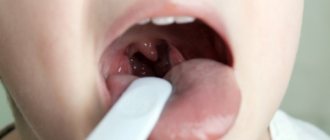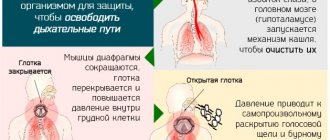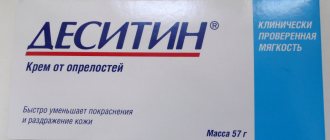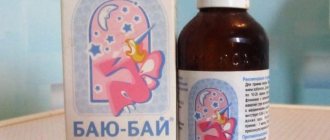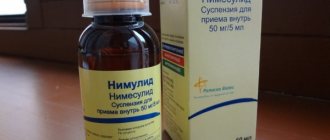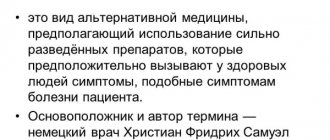Amiksin® is a modern antiviral drug, an inducer of interferon formation. Enhances the production of antibodies during ARVI. Maximum activity is already in the first 24 hours.
Trade name of the drug: Amiksin® International nonproprietary name: Tiloron Chemical name: 2,7-bis-[2(diethylamino)-ethoxy]-fluoren-9-one dihydrochloride Dosage form of the drug: film-coated tablets
Description Composition per tablet Pharmacological properties Indications for use Contraindications Use during pregnancy and breastfeeding Method of administration and dosage Side effects Overdose Interaction with other drugs Effect on the ability to drive vehicles and machinery Release form Expiration date Storage conditions Dispensing conditions from pharmacies Name and address of the manufacturer/organization receiving consumer complaints
Composition per tablet
Tiloron - 60 mg or 125 mg.
Excipients: core: potato starch - 25,500 mg or 46,000 mg, microcrystalline cellulose - 60,000 mg or 120,000 mg, povidone-K30 (kollidon 30) - 1,500 mg or 3,000 mg, calcium stearate - 1,500 mg or 3,000 mg, croscarmellose sodium ( primellose ) – 1,500 mg or 3,000 mg; shell: hypromellose (hydroxypropyl methylcellulose) – 3.4050 mg or 6.8100 mg, titanium dioxide – 1.7815 mg or 3.5630 mg, macrogol-4000 (polyethylene glycol-4000) – 0.4565 mg or 0.9130 mg, polysorbate -80 (Tween-80) – 0.0570 mg or 0.1140 mg, quinoline yellow dye (E 104) – 0.1235 mg or 0.2470 mg, sunset yellow dye (E 110) – 0.1765 mg or 0.3530 mg.
Pharmacotherapeutic group: antiviral immunostimulating agent – inducer of interferon formation.
ATX code: J05AX
Adults, over 18 years of age
Treatment of influenza and ARVI: 125 mg during the first 2 days of treatment, then resume taking 125 mg after 48 hours. The course requires 6 tablets. or 750 mg.
How to take Amiksin to prevent influenza? For preventive purposes, Amiksin is taken once a week, 125 mg, course 6 tablets, 750 mg. The full preventive course is 6 weeks.
For the treatment and prevention of cytomegalovirus infection or herpes, it is necessary to take 125 mg in the first two days, then 125 mg after 48 hours. A course of 10-20 tablets, 1.25-2.5 g for the prevention of herpes.
Viral hepatitis A. Dosage should not be delayed, but should be started on the first day, 24 hours. You need to take 125 mg of Amiksin twice, then take 125 mg after 48 hours. A full course requires 10 tablets with a total weight of 1.25 g. The effectiveness of the drug in the treatment of viral hepatitis C is about 85%.
Acute form of hepatitis B. The first two days you need to drink 125 mg, after which 48 hours later 125 mg are taken. For 1 course you need 16 tablets. weighing 2 g. If the course of hepatitis B is prolonged, then it is recommended to take the drug twice a day, 125 mg, then after 48 hours, take another 125 mg. A total of 20 tablets are required for the course. total weight 2.5 g. Before starting treatment, you need to consult your doctor and determine the dosage.
Chronic hepatitis B. It is important not to miss the initial stage. A total of 20 tablets are required for the course. weighing 2.5 g. For the first 2 days, take 125 mg 2 times a day, after 48 hours, repeat 125 mg. Then the drug is taken once a week, 125 mg. The duration of therapy is up to 6 months. The amount of the drug is regulated after immunological, as well as biochemical studies required for viral infections, consultation with the attending physician is required. Doctors recommend taking Amiksin before or after meals, observing the water regime.
Acute hepatitis C. During the first two days, the patient needs to drink 125 mg of Amiksin per day, after 48 hours another 125 mg. The course will take approximately 20 tablets. total weight 2.5 g.
Amiksin 125 mg
In the chronic form of hepatitis C, 20 tablets are required at the initial stage of treatment. In the first two days, the drug is taken 2 times a day, 125 mg, then after 48 hours, another 125 mg. The duration of administration is distributed over a week in advance and is 20 tablets. This is the dosage for a course that lasts up to 6 months.
When treating a neuroviral infection, for the first 2 days the patient takes 125 g (250 mg) per day, after 48 hours the intake is resumed at 125 mg of the drug. The course of treatment for neuroviral infection is 34 weeks and is selected individually.
Amiksin is prescribed for pulmonary tuberculosis. In the first 2-3 days of the course you need to drink 250 mg, after 48 hours another 125 mg. A full course of treatment requires 20 tablets. 2.5 g each
Pharmacological properties
Pharmacodynamics. A low-molecular-weight synthetic interferon inducer that stimulates the formation of all types of interferons in the body (alpha, beta, gamma and lambda). The main producers of interferon in response to the administration of tilorone are intestinal epithelial cells, hepatocytes, T-lymphocytes, neutrophils and granulocytes. After taking the drug orally, the maximum production of interferon is determined in the sequence intestines - liver - blood after 4-24 hours. Amiksin® has an immunomodulatory and antiviral effect. In human leukocytes it induces the synthesis of interferon. It also stimulates bone marrow stem cells, depending on the dose, enhances antibody formation, reduces the degree of immunosuppression, and restores the ratio of T-suppressors and T-helpers. The drug is effective against various viral infections, including influenza viruses, other acute respiratory viral infections, hepatitis viruses and herpes viruses. The mechanism of antiviral action is associated with inhibition of the translation of virus-specific proteins in infected cells, as a result of which viral reproduction is suppressed.
Pharmacokinetics. After oral administration, Amiksin® is rapidly absorbed from the gastrointestinal tract. Bioavailability – 60%. About 80% of the drug binds to plasma proteins. The drug is excreted almost unchanged through the intestines (70%) and through the kidneys (9%). Half-life (T1/2) – 48 hours. The drug does not undergo biotransformation and does not accumulate in the body.
Pharmacological action of the drug
The drug is a synthetic interferon inducer. The mechanism of action of Amiksin is based on the ability to most effectively stimulate the production of endogenous interferon, namely interferon alpha, gamma and beta.
Amiksin also has a pronounced antiviral as well as immunomodulatory effect. At different doses, the drug can reduce the degree of immunosuppression. Amiksin is determined in the body in the following sequence, this is how it is absorbed: intestines - liver - blood. It can be observed at regular intervals from 4 to 24 hours. The drug is quickly absorbed into the gastrointestinal tract, its availability to the body is about 60%. It is excreted unchanged through the intestines and kidneys. Amiksin does not accumulate in the body after administration, which means it does not undergo transformation as a biological substance.
Directions for use and doses
Amiksin® is taken orally after meals.
For children from 7 to 18 years: For uncomplicated forms of influenza and other acute respiratory viral infections - 60 mg 1 time per day on the 1st, 2nd and 4th day from the start of treatment. The course dose is 180 mg (3 tablets).
For adults (over 18 years old). For the treatment of influenza and other acute respiratory viral infections - 125 mg per day for the first 2 days of treatment, then 125 mg after 48 hours. The course dose of Amiksin® is 750 mg (6 tablets).
For the prevention of influenza and other acute respiratory viral infections - 125 mg once a week for 6 weeks. Per course - 750 mg (6 tablets).
For the treatment of herpes, cytomegalovirus infections - the first two days, 125 mg, then after 48 hours, 125 mg. Course dose – 1.25–2.5 g (10–20 tablets).
When treating influenza and other acute respiratory viral infections, if symptoms of the disease persist for more than 4 days, you should consult a doctor
Dosage, for what diseases is Amiksin prescribed to children?
Amiksin is prescribed to children for the treatment and prevention of viral diseases: influenza, ARVI, herpes infection. The drug is also used to treat other bacterial infections - chlamydia, mycoplasmosis, ureaplasmosis.
Uncomplicated forms of influenza, as well as ARVI: 60 mg once a day on the first, second and fourth days from the start of treatment. Course 3 tablets or 180 mg.
Complications of influenza and ARVI: 60 mg once a day on days 1, 2, 4 and 6 from the start of treatment. Course 240 mg or 4 tablets. The effectiveness of the drug in the treatment of influenza and ARVI is 80-100%.
How often can children take Amiksin?
The drug is prescribed only as part of complex therapy; Amiksin is not prescribed to children for prophylaxis.
Indications for use of Amiksin
Amiksin has an immunomodulatory and antiviral effect.
Amiksin is an antiviral drug, an inducer of interferon synthesis. Used in adults for the treatment of viral hepatitis A, B, C, herpes and CMV infections, in complex therapy: infectious-allergic and viral encephalomyelitis (multiple sclerosis, leukoencephalitis, uveoencephalitis), chlamydial infections of the urogenital and respiratory tract; prevention of influenza and ARVI. In children over 7 years of age, Amiksin is used to treat influenza and other acute respiratory viral infections.
Instructions for use
The tablets are intended to be taken orally after meals.
- To prevent hepatitis A, you need to drink 1 tablet once every 6-7 days, for 5-6 weeks. For therapy you need to take 2 tablets on the 1st day and after 2 days, 1 tablet. In total you need to take 10 tablets.
- To treat hepatitis B, you need to drink 1 tablet in the first 2 days, and after 2 days, 1 tablet. The course of treatment is 16 tablets. In the chronic form of the disease, the course of treatment can last six months.
- For the treatment of hepatitis C, you need to take 1 tablet in the first 2 days, and after 2 days, 1 tablet. In total you need to take 20 tablets. For chronic illness, the course of treatment can be increased to 40 tablets.
- For colds and flu, you need to take 1 tablet in the first 2 days, and then 1 tablet after 2 days. A total of 6 tablets are required.
- Patients with tuberculosis need to take 2 tablets in the first 2 days, and then 1 tablet after 48 hours. The therapeutic course includes taking 20 tablets.
- For chlamydia, in the first 2 days you need to take 1 tablet, and then 1 tablet. every 2 days. The treatment course includes 8 tablets.
- Patients with cytomegalovirus infection should take 1 tablet in the first 2 days, and then 1 tablet every 48 hours. The maximum duration of treatment is 1.5 months.
- If neuroviral diseases of infectious origin are detected, then you need to take 1 tablet in the first 2 days, and then 1 tablet every 48 hours. The course of treatment involves taking 10 tablets.
How Amiksin® 125 mg works
The antiviral effect of Amiksin® is achieved due to its etiotropic and pathogenetic action.
- Amiksin® increases the body's overall resistance to viral infections and other diseases by stimulating the immune system. As a result of its intake, the production of endogenous interferon of all types (alpha, beta, gamma and lambda) is activated, the formation of specific antibodies is increased, and the ratio of T-lymphocytes is normalized. Taking Amiksin® helps improve the condition of the immune system without grossly interfering with its work and without introducing foreign components, since the production of its own interferons is stimulated.
- The drug has a direct antiviral effect: by preventing the synthesis of virus-specific proteins in affected cells, it is able to suppress the reproduction of viruses.
In addition, a number of advantages of the drug should be noted.
- Amiksin® 125 mg is available in a convenient form - tablets for oral administration. The number of tablets in one package is sufficient for a complete standard course of prevention or treatment of influenza and other acute respiratory viral infections.
- Amiksin® 125 mg is compatible with other drugs used for viral infections - etiotropic, symptomatic, antibacterial.
Analogs
Good analogues of Amiksin are:
Lavomax is a drug that has antiviral and immunomodulatory effects. Prescribed for various forms of hepatitis, herpes, pulmonary tuberculosis, ARVI, influenza, chlamydia. Prescribed for complex therapy. Contraindicated in pregnant women, during lactation, and persons under 18 years of age.
Tiloram is a drug that has an antiviral effect. Taken for hepatitis A, B, C, influenza, ARVI. Contraindicated for pregnant women and children under 18 years of age.
Tiloron is an antiviral drug that has a stimulating effect on the human immune system. Effective in the treatment and prevention of influenza and acute respiratory viral diseases. Also helps with tuberculosis, hepatitis and multiple sclerosis. Do not take during pregnancy, breastfeeding or children under 7 years of age.

